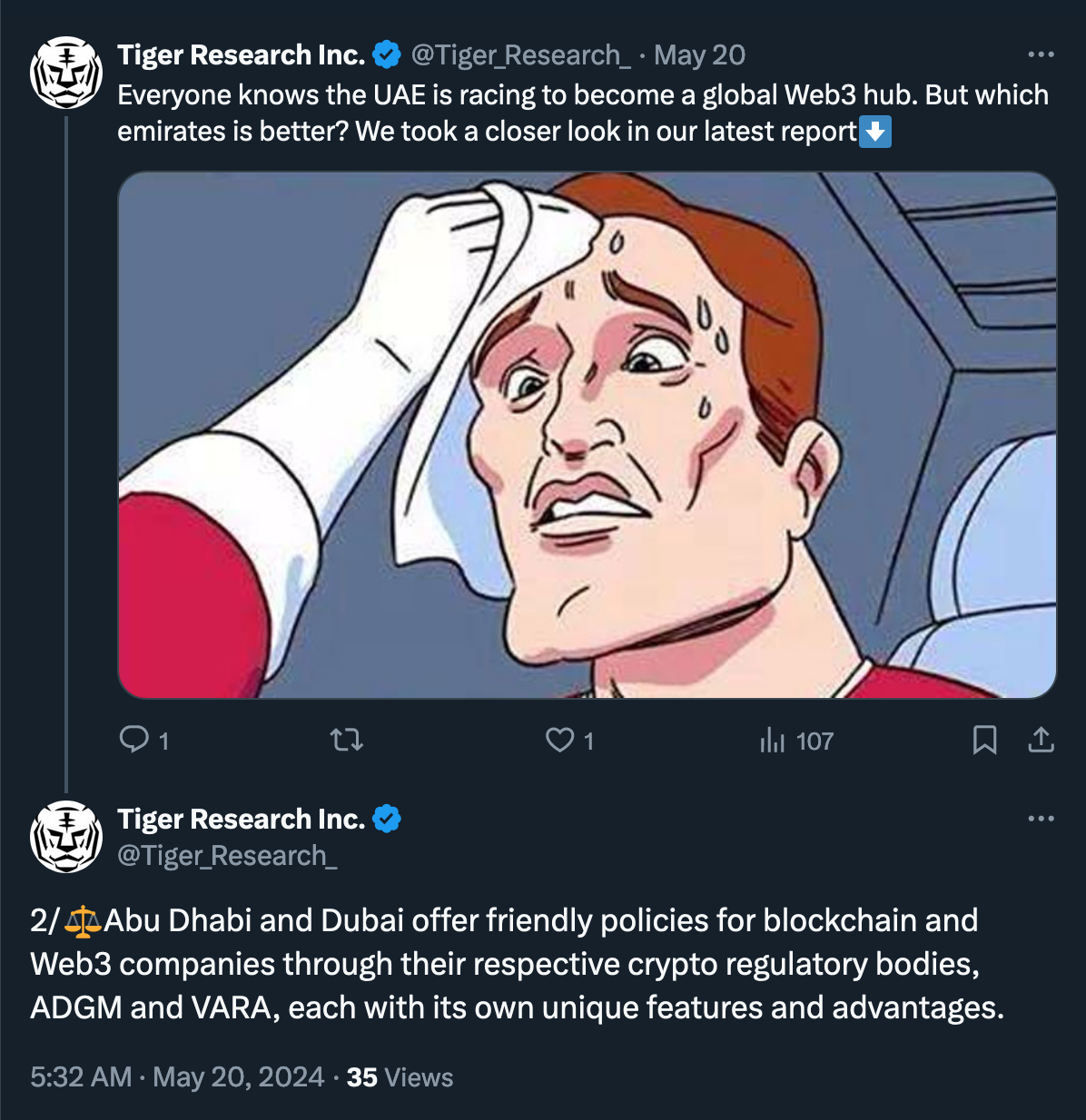As Abu Dhabi and Dubai challenge Singapore's stance as the region's main crypto hub, there is a growing trend of crypto businesses moving toward UAE, attracted by their clear regulations and business-friendly policies. However, these two regions offer distinctly different advantages, and the optimal choice for crypto projects might depend on many variables, including the type of business, target markets, support needs, etc, as detailed in a recent report by Tiger Research.

Both Abu Dhabi and Dubai provide favorable policies for blockchain and Web3 companies through their respective regulatory bodies: Abu Dhabi Global Market (ADGM) and Virtual Assets Regulatory Authority (VARA)— each with its own unique features and advantages.

Abu Dhabi, a financial free zone, offers a legal framework that covers a broad range of financial sectors and meets global standards. Of the key merits, researchers note a business-friendly environment, generally favorable legislation, and sandbox support to create innovative services not bound by existing financial legislation.

ADGM recognizes and licenses a wide range of products, including digital securities, stablecoins, derivatives, funds, and cryptocurrencies, through its regulator, the FSRA. There are two main categories:
- Multilateral Trading Facilities: these are exchanges.
- Non-Exchange Businesses: these include dealers, custodians, and other similar activities.
A significant advantage is that companies do not need separate licenses for each activity category; for example, a company can engage in both crypto brokerage and custody under one license.

Dubai's Virtual Assets Regulatory Authority (VARA), on the other hand, is a dedicated body responsible for regulating and supervising virtual assets and related activities, including NFTs. Dubai's notable merits include a segmented licensing system that promotes market health and innovation and substantial tax benefits.
The Dubai Multi Commodities Centre (DMCC) and Dubai International Financial Centre (DIFC), both part of the Free Zone, offer substantial tax incentives: no income or corporate tax until 2054, and tax breaks are available for 50 years for foreign financial companies.
Dubai issues individual licenses for each of the following services: 1) Virtual Asset Issuance, 2) Advisory, 3) Broker-Dealer, 4) Custody, 5) Exchange, 6) Lending/Borrowing, 7) VA Management and Investing Service, and 8) VA Transfer and Settlement Service. Companies can apply for multiple licenses simultaneously, offering a one-stop service legally.
Both Abu Dhabi and Dubai offer favorable tax environments, business-friendly conditions, and proactive cryptocurrency regulations, but each has distinctive features.

(Source)
"If your business plan involves traditional financial activities alongside virtual assets, ADGM might be more suitable due to its broader regulatory scope and integration support. Conversely, if your focus is solely on virtual assets and you prefer a regulatory environment with clear guidelines, VARA may be the better choice." (Tiger Research)

In 2023, ADGM launched ‘Hub71+ Digital Assets’, a $2+ billion fund to support Web3 startups and blockchain technology. VARA, on the other hand, recently introduced a program in which larger firms subsidize licensing costs for smaller firms, easing their financial burdens and facilitating license acquisition.
Both regulators actively attract companies, with some regional variations: Dubai attracts more Japanese Web3 companies, while Abu Dhabi draws in Korean Web3 companies, including Neopin and WeMade.
MetaTalks disclaims responsibility for any investment advice that may be contained in this article. All judgments expressed are solely the personal opinions of the author and the respondents. Any actions related to investing and trading in crypto markets involve the risk of losing funds. Based on the data provided, you make investment decisions in a balanced, responsible manner and at your own risk.

